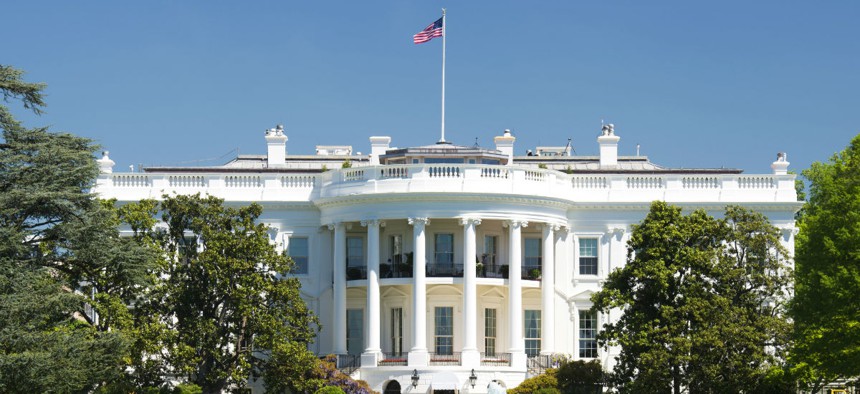
Andrea Izzotti / Shutterstock.com
White House Announces Inaugural Participants in Program to Develop New Federal Leaders
Fellows went through "rigorous" selection process and come from "all walks of life," OPM says.
The Obama administration on Tuesday announced the first-ever class of the White House Leadership Development Program, an initiative the president created last year in an effort to cultivate a new cadre of top career federal managers.
Sixteen federal supervisors currently employed as General Schedule-15s from agencies throughout government will participate in the program, in which the managers will spend one year making stops across government to tackle cross-agency projects. The participants went through a “rigorous selection process,” acting Office of Personnel Management Director Beth Cobert said, and come from “all walks of life and every corner of America.”
Cobert said the program was necessary “to provide opportunities for federal employees to build the experiences, skillsets and networks that are critical to enterprise leaders.”
President Obama announced the program last year in a speech to 3,000 members of the Senior Executive Service, saying it provided a “terrific opportunity” to modernize government.
“One thing we have to acknowledge is that our government was statutorily organized for the needs of the 1930s, 40s, or 60s and too often we get stove-piped by it at a time when we need people with different skill sets at different agencies to be working together,” Obama said at the event.
His administration has prioritized development of federal managers in its second term, with “people and culture” one of the pillars of its management agenda.
The goals of the new leadership development program, Cobert said, are to retain and grow “top talent” by allowing employees to engage in “complex, cross agency challenges,” and to improve agencies’ delivery on those challenges.
“We are excited about the opportunity that the WHLD Program brings and its potential to train future leaders on how to address challenges that cut across agency boundaries,” Cobert said.
The inaugural 16 “fellows” in the program, announced by the White House, are GS-15s but are already approved for the SES through their agencies’ “candidate development programs,” currently participating in a CDP or have been identified as having “high potential.” All the participants also had annual ratings of at least “exceed expectations” and demonstrated ability to “take on increasing responsibilities and leadership roles.” Fellows must have also shown skills such as working collaboratively, communication, adaptability, strategic planning, political awareness, and the ability to identify and overcome challenges.
Interested agencies were allowed to nominate up to three candidates through their deputy secretaries by Aug. 1. Those nominees were pared down by a steering committee and finalized by a selection committee. The White House has said the program could expand to include more participants in future years.
In their normal day jobs, the first crop of fellows work in areas ranging from contracting to human resources to disaster response to campaigns and contingency planning for the Defense Department’s Joint Chiefs of Staff to promoting democracy and growth in the Middle East. They are expected to begin their rotational program this month. The administration is also expected to unveil its recommendations to reform the SES later this year.
The 16 fellows are:
- Dr. Susan Camarena: chief knowledge and learning officer, Federal Transit Administration
- Darbi Dillon: deputy, Contracting Operations Division, Defense Department
- Claire Ehmann: division chief, Civil Society and Media, Bureau for Democracy Conflict and Humanitarian Assistance, U.S. Agency for International Development
- Andrew Garrett: director, National Disaster Medical Systems, Health and Human Services Department
- James Ghiloni: Federal Acquisition Services, General Services Administration
- Elaine Ho: deputy chief of staff, Internal Revenue Service
- Bruce Hollywood: deputy chief, Joint Staff Pentagon
- Christopher Landers: Reactor Conversion Program director, Department of Energy
- Tiffany Lightbourn: chief of research and evaluation at U.S. Citizenship and Immigration Services
- Jeremy Pelter: business operations officer, Office of Investment and Innovation, Small Business Administration
- Jessica Powers: director for Space Policy Engagement, Defense Department
- Daniel Schoettinger: deputy director, Office Of Selective Acquisitions, Homeland Security Department
- Jack Schreibman: deputy associate administrator, Maritime Administration, Transportation Department
- Kala Surprenant: team lead, Individuals With Disabilities Education Act, Office General Counsel, Education Department
- Gordon Weynand: director, Technical Services Division, Office of Afghanistan and Pakistan Affairs, U.S. Agency for International Development
- Marc Wynne: deputy director, Provider Billing Group, Health and Human Services Department
(Image via Andrea Izzotti / Shutterstock.com)







